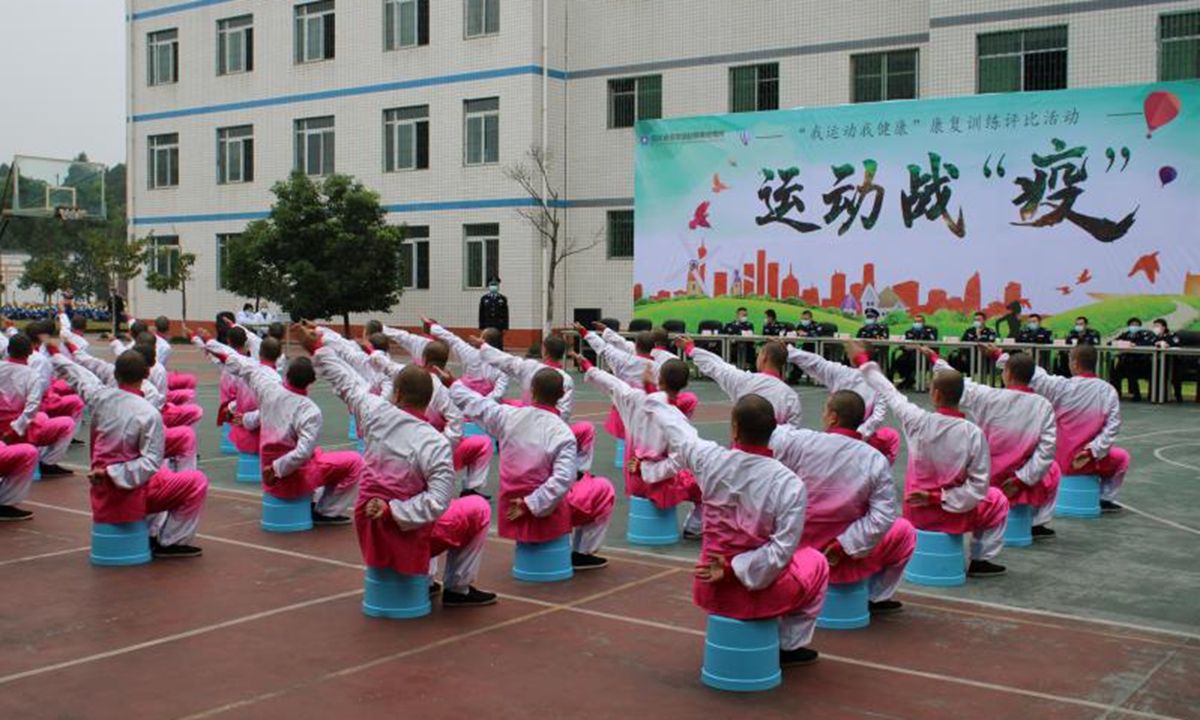SW China's Sichuan Province makes efforts to help AIDS-infected drug addicts through humane care
By Li Qiao Source: Global Times Published: 2020/11/24 22:23:40

AIDS drug addicts take part in rehabilitation training activities. Photo: Sichuan Drug Rehabilitation Administration
By the end of 2019, there were 2.148 million drug addicts in China, accounting for 0.16 percent of the country's total population, a decrease of 10.6 percent from a year earlier, according to the China Drug Situation Report 2019 released on June 16, 2020.
The amount of drug addicts in Southwest China's Sichuan Province ranks second in China behind Yunnan Province. Due to the influence of economic and social development and geographical location, the number of addicts with AIDS in Sichuan accounts for a certain proportion.
The law School of Beijing Normal University (BNU) and Sichuan Administration of Drug Rehabilitation cooperated in conducting a two-year project to research the classification management and care relief for AIDS-infected addicts.
Through an empirical study of two drug control centers in Sichuan, they collected problems and experiences of classified management, care and relief with self-administered questionnaires and interviews. Based on qualitative and quantitative analysis, they concluded an initiative approach by combining safety management, humanistic care, medical treatment, and social inclusion to better help AIDS-infected addicts and released their findings in a symposium in Beijing on Monday.
"China never abandons any AIDS-infected addicts and has basically achieved their classified management and comprehensive rehabilitation, thus enabling more of them to regain their courage in life. The research results of this project deserve to be replicated and promoted in the national drug rehabilitation system," Cao Xuejun, head of the detox administration under the Ministry of Justice, said at the symposium.
According to the official website of Ministry of Justice, there are 44 HIV screening laboratories and one confirmation laboratory in China's national judicial and administrative drug rehabilitation system as of June 26. Twenty-five local medical institutions in 15 provinces have provided medical services for drug addicts.
Centralized treatment and rehabilitation is provided to addicts with AIDS. All who meet the requirements and are willing to receive treatment receive systematic and standardized anti-retroviral treatment. Psychological counseling and intervention are provided to guide drug addicts with AIDS to embrace their life positively and optimistically, Cao said.
Drug addicts with AIDS often have weaker immune systems than other addicts, which brings them physical weakness. Many drug addicts are infected with HIV by sharing needles after drug use or engaging in unsafe sex after drug use. Some from the LGBTQ community also suffer more discrimination than normal addicts in a conservative social environment.
"Comprehensive psychological counseling is needed for HIV-infected addicts' rehabilitation work, and a rehabilitation environment without discrimination against homosexuals should be created in the rehab center. If they have lost hope in life they may provoke aggressive behavior and deliberately transmit HIV to front line workers. The goal is not only to prevent relapse of drug but also to prevent the spread of HIV," Lei Xiaozheng, director of the project and professor of Law School of BNU, told the Global Times on Monday.
Of the 50 HIV-addicts Lei's team interviewed, 30 were male and 20 female.
One HIV-infected addict with a master's degree was someone whom Lei knew as his mentor.
That man has a wife and kid, even though he is gay, said Lei. His guilt about his affair with his lover tortured him every day and pushed him to use drugs as a means of escape.
Every HIV-infected addict has his or her own story and appeal, who may be both the perpetrator and the victim. We need to protect their rights and interests, from the living environment to the mental health system to create a reliable care environment for them to quit addiction, Lei said.
AR Drug rehabilitation
Besides promoting humanistic care, Artificial Intelligence (AI) and Augmented Reality (AR) technology have also been used in drug rehabilitation in Sichuan Women Compulsory Drug rehabilitation Center.
This AR rehabilitation system is mainly aimed at meth addicts. During the treatment, addicts wear AR glasses and are monitored for electro cardio, galvanic skin responses and heart rate.
Drug paraphernalia or drug use place will be virtually presented in front of the addicts through AR technology to help the patient with desensitization treatment.
"Addicts are then subjected to a comprehensive addiction and psychological assessment to determine what they see to ensure that the desensitization treatment does not create negative stimuli," Zhou Li, deputy director of Sichuan Women Compulsory Drug rehabilitation Center, told the Global Times on Monday.
For those with good withdrawal, interactive virtual games can also be played with hands to break drug paraphernalia.
Under this system, the relaxation training and psychological intervention combined with the equipment and psychological counselors will also help addicts better reach detoxification, Zhou said.
Traditional methods, such as interviews and observations, allow supervisors to determine whether an addict has truly kicked the habit. This AI+AR drug rehabilitation system helps us quantify how addicts' bodies feel when they see images of drug abuse, providing a more accurate reference for determining whether they are completely free of addiction, Zhou noted.
A 30-year-old teacher, who returned to rehabilitation Center in August after a year of rehab, told Zhou that if she had had such AR technology to exercise and test her resistance to drugs before she left the center last time, she may not have failed.
She thought she had really kicked the habit in the center, full of determination. But when she saw the drugs, she couldn't resist the temptation, Zhou said, noting the effectiveness of promoting high-tech in drug rehabilitation.
RELATED ARTICLES:
Posted in: IN-DEPTH